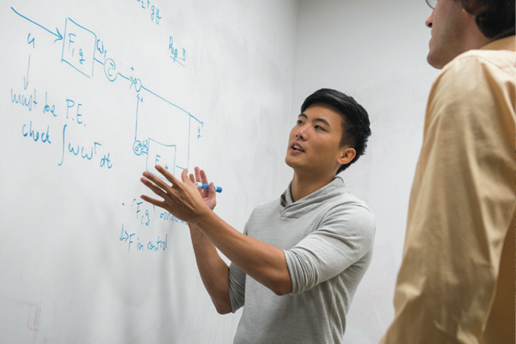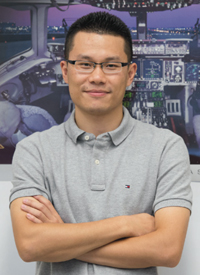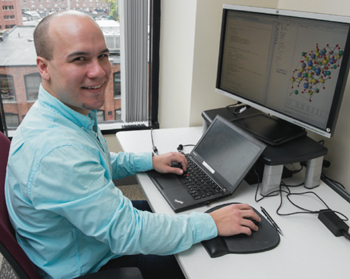
As a Sustaining Member of the MIT Energy Initiative (MITEI), Bosch has engaged in research collaborations with MIT faculty since 2008. But Aleksandar Kojic SM ’98, PhD ’01, department head of Energy Technologies at the Bosch North America Research and Technology Center, envisioned something more: “We wanted to enhance the collaboration and felt we could strengthen our ties if MIT graduate students worked in our facilities,” he says.
Kojic’s aspiration was realized in summer 2014 with a successful pilot test of MITEI’s US internship program. Three graduate students, selected by Bosch representatives and MIT faculty advisors, dove into energy research projects at Bosch laboratories in Palo Alto, California, and Cambridge, Massachusetts, with MITEI coordinating the logistics of transportation, lodging, and paperwork. “We wanted students to get the most out of their experiences,” says Christie Ko, MITEI assistant director for member relations. “Running an internship program is a big undertaking, and in this test drive we aimed to do it right.”

During his Bosch internship, Max Zheng Qu of mechanical engineering worked on physics-based models and control strategies for advanced high-efficiency gasoline engines.
Based on the reactions of students and administrators, the trial run of the program did just that. “It was very exciting working there,” says Max Zheng Qu, a third-year PhD candidate in mechanical engineering stationed in Palo Alto for the summer. Qu researched modeling and controls for an improved efficiency gasoline combustion engine. After completing the project, he says, “I feel proud because I developed something that can work on real hardware.”
Eric Hontz, a fifth-year PhD candidate in physical chemistry, says his Cambridge-based internship changed him. He was engrossed in the details of debugging and extending sophisticated software-computer coding essential to the high-speed computation Bosch requires for developing next-generation, solid-state battery storage. “The internship opened my eyes to a whole other side of computer programming that is pure thought experiment,” he says. “It’s a kind of problem solving that is truly joy-giving and that I learned I am well suited for.”
Pierre Bi, a second-year master’s student in mechanical engineering from Switzerland, found the pace of Bosch R&D “very refreshing.” His summer work at the Palo Alto facility involved developing and demonstrating software methods for monitoring the state and parameters of lithium ion batteries and ensuring that maximum energy can be extracted from these batteries safely without diminishing their capacity. The research was designed to serve as a building block in his master’s studies. Bi relished participating in a fast-moving team focused on product development. “Seeing how research is conducted in industry was my main takeaway from the summer,” he says.

Eric Hontz of chemistry worked with Bosch on the computational design of materials for electrochemical energy storage, with a focus on crystalline and amorphous materials for lithium ion battery cathodes and electrolytes.
Providing a supplement to the academic research experience is one of the primary reasons for undertaking the program. “The internship gives graduate students a lot more relevance to the work they’re doing at MIT, showing them it isn’t just an ivory tower intellectual pursuit, but research with great application potential,” says Dr. Anuradha Annaswamy, senior research scientist in the Department of Mechanical Engineering and Bi’s thesis advisor. Her multi-year project with Bosch spawned Bi’s thesis work and his internship there. “It gives students more motivation and a rationale for why they’re doing what they’re doing at MIT, and helps them figure out what their place will be in the larger canvas of research,” she notes.
“We [at Bosch] have a driving motivation to build a relationship with MIT students,” says Kojic, “both in terms of the specific talents and expertise they bring from a short-term perspective, and because of their potential recruitment in the long term.” Through the internship program, Bosch provides graduate students with hands-on experience as well as a preview of a career at Bosch.
Boris Kozinsky BS ’00, PhD ’07, senior scientist leading the Bosch Research and Technology Center in Cambridge and Eric Hontz’s supervisor, attests to the immediate benefits of the internship: “This summer, Eric really ran with the project to develop an automation platform for our battery work, and now we have a new set of capabilities we didn’t have before.”
This is the kind of progress MITEI Director Robert Armstrong likes to see. “Since MITEI began, we have been working to build a population of students working on energy-related research problems,” he says. “Now, in addition to filling the pipeline, there’s the additional need to connect students to great careers where they can actually contribute to the creation of new products. Industry is the place for that work, and these internships provide a novel opportunity.”
There is little chance that the three MIT graduate students piloting MITEI’s US internship program will squander this opportunity. Bi is returning to MIT with the results of his summer work, which will be incorporated soon into his master’s thesis. He also carries memories of a “warm and friendly” Palo Alto workplace, which will figure in the coming year as he ponders his professional options. The internship, he says, has brought him to “a crossroads in deciding a career path.”
Qu, whose graduate studies revolve around developing adaptive controls for an experimental aircraft, says that his Bosch project gave him “another perspective into areas where my research work can be applied.” After this summer’s experiences, he says he is “increasingly confident of pursuing an industrial career.” An airplane enthusiast, Qu also fulfilled a childhood dream this summer and started flying lessons. His professional goals now involve pursuing “cutting-edge, exciting research” within the aviation industry. His entire California experience paid off, says Qu: “I really cherished my time there.”
This year, Hontz will be completing his PhD involving theoretical work on organic photovoltaics and LEDs. But following this summer’s internship, he has a different sense of career possibilities. He discovered he really enjoyed delving deep into coding, especially the “quick rewards that come from breaking up problems into well-defined chunks.” Hontz realized that academic research, with its sometimes open-ended questions and longer timelines, may not be the best course for him. This was, he says, “a valuable lesson to learn.” Now, Hontz says, his “first choice is doing something with programming, in the service of energy.” And should Bosch come calling after graduation, he adds, “I would highly consider a position with them.”
This article appears in the Autumn 2014 issue of Energy Futures.